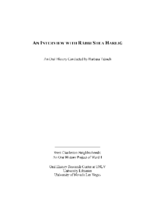Search the Special Collections and Archives Portal
Search Results

Transcript of interview with Patricia "Pat" Marchese and Lamar Marchese by Stefani Evans and Claytee White, February 7, 2017
Date
Archival Collection
Description
In this interview, the cultural power couple recall their early impressions of Las Vegas, their beloved Ninth Street house built by Marion Earl, and the changes that caused them to move when spot zoning destroyed their close-knit downtown neighborhood. Lamar speaks of the founding of public radio KNPR and KCNV, of finding studio space, of obtaining grant money to build on the campus of the (now) College of Southern Nevada, and of acquiring the Peter Shire sculpture that graces the front of the studio. He talks about the vision of Charles Hunsberger, of Hunsberger's fall, and of politically appointed boards of trustees. Pat shares her experience of meeting people in a babysitting co-op and the UNLV Art Department, getting her UNLV Master's degree in public administration, and her work in cultural programming with the City of Las Vegas and with Clark County. She speaks of creating gallery, classroom, and performing space at the City's Reed Whipple building and the Charleston Heights Art Center; of founding the Rainbow Company Youth Theatre; of developing Clark County's Desert Breeze Park, Flamingo Senior Center, and the Wetlands, among others; of placing exhibits of the Clark County Museum at McCarran International Airport; of the Public Arts Commission, the Airport Arts Commission, the Allied Arts Council, and of developing Community Development Block Grant programs for the City of Las Vegas and Clark County. Throughout the interview, Pat and Lamar Marchese exemplify why Southern Nevada got lucky in 1972. As the duo grew in their knowledge of and passion for the arts, they also honed their skills at bringing the arts to the public. And we, the Southern Nevada public, continue to benefit as their legacies live on through public radio, community arts programming, and useful and accessible parks.
Text

Transcript of interview with Harriet Trudell by Caryll Batt Dziedziak, May 3, 2006
Date
Archival Collection
Description
Born on August 22, 1935, Harriet spent her childhood years in the segregated southern cities of St. Petersburg, Florida and Mobile, Alabama. Daughter to a blue collar plumber, who was also a union organizer and ‘rabid Democrat,’ Harriet recalls her father saying, “Remember children, you know what meat tastes like because there’s a man named Franklin Roosevelt.” Unsurprisingly, she grew up thinking Roosevelt was God. With her mother’s sudden death at age thirty-one from a cerebral hemorrhage, ten year old Harriet spent two years at a boarding school before rejoining her younger brother at her maternal grandparents in St. Petersburg. Florida. During this time, her father also based out of the grandparents’ home while following big construction work opportunities at various cities. In 1948, sixteen-year-old Harriet accompanied her father, an Alabama Delegate, to the Democratic National Convention. Hearing Hubert Humphrey’s Civil Rights speech change her life. “I came home from that conve
Text

Transcript of interview with Joanne Pattiani Molen by Irene Rostine, January 25, 1997
Date
Archival Collection
Description
Interviewed by Irene Rostine. In July of 1955, Joanne Molen's husband was offered a job at Nellis Air Force Base, so they moved from Alturas, California, to Las Vegas. Joanne had worked for Citizens Utilities in Alturas as a Western Union teletype operator, so she got a job with the Southern Nevada Telephone Company. She was the only woman to hold some of the positions she held. She worked for the telephone company, which became Sprint, for more than forty years, ending up as a main engineer. Joanne also was a volunteer and was active in community organizations including the American Ex-Prisoners of War and the Disabled American Veterans organizations, which lead to her being appointed by Governor Richard Bryan to the state of Nevada's Veterans Advisory Commission where she became the first woman to hold the position of chairman for the Commission. She was also voted Women of the Year four times by the local chapter of the American Business Women's Association for her work with veterans.
Text

Transcript of interview with Flora Mason by Barbara Tabach, December 8, 2014
Date
Archival Collection
Description
Flora Mason (1940- ) is a Las Vegas, Nevada philanthropist and community leader. She was born Florica Esformes to a Sephardic Jewish parents who emigrated from Greece to New York. This Mediterranean influence can be seen in the meals she serves for the Jewish holidays. Flora?s grandfather had a pushcart business in New York and her father became a produce broker, which led the family to Miami, Florida. She graduated from high school in Miami and also met Stuart Mason there. The young couple married in 1958. They had been married for 58 years when Stuart passed away in 2012. In this oral history, Flora recalls her life?from witnessing signage that read: no blacks, no dogs, no Jews in the South to meeting her husband while a teenager to raising her three children in Las Vegas. Along the way, she has always found time to form fast friendships and to inspire productive community organizations. v For example, Flora and Stuart founded the Las Vegas Chapter of the Juvenile Diabetes Foundation in 1970. It was a disease that their daughter Deborah had suffered from. They also established the Mason Undergraduate Peer Coach Program at University of Nevada, Las Vegas Libraries in 2006. Flora was the first woman elected by the general membership to serve on the Temple Beth Sholom Board of Directors. She has served on the National Board of Directors of the Juvenile Diabetes Research Foundation, been involved with the Jewish Federation of Las Vegas, the Anti-Defamation League among many other Jewish and non-Jewish community organizations. Flora?s college education began at the University of Miami and focused on completing both her undergraduate and graduate degrees at UNLV, where she majored in English literature. She then became a lecturer in the UNLV English department from 1985 to 1993. Flora and Stuart Mason had three children: sons William and James who joined the family?s successful three-generation commercial construction business Taylor International, and daughter Deborah. In this oral history, Flora shares the joy of being a grandparent, her love of travel, and the opportunities of meeting Israeli dignitaries over the years. She also candidly reflects on dealing with grief and the Jewish rituals surrounding death.
Text

Transcript of interview with Dedee (DaVeen) Nave by Claytee D. White, June 8, 2015
Date
Archival Collection
Description
Dedee (DaVeen) Nave reveals a life filled with distinguished results in the cultural evolution of Las Vegas since her move to the valley in 1971. She was a young bride and soon a mother when she arrived with her can-do energies. She was a trained educator who was eagerly looked outside the classroom for a way to make a difference in the community when she took a position with the Camp Fire Girls Over the following decades, the impact of involving Dedee in many valued projects is evident. In this interview, she provides a glimpse into her various aptitudes and the many people she has worked with to great results. Dedee Nave was born DaVeen Maurer in 1948 in Indianapolis, Indiana, to David and Virginia Maurer and has a sister, Marilyn Maurer MacCollum. Their mother was a convert to Judaism who instilled them with a solid Judeo-Christian foundation. When Dedee became the bride of a mixed marriage, she raised her daughter Alisa in the Jewish faith. Alisa, who is married to Robb Worth, is a practicing attorney in Las Vegas. A graduate of Stephens College in Columbia, Missouri, Dedee studied fine arts, considered being a theater major, modified her plans and became a skilled organizer of people and projects. This ability to envision, implement, and fundraise is seen in Dedee?s distinguished list of community programs, among them her work with: the City of Las Vegas Arts Commission; two terms on the Nevada State Arts Council; a past president of the Junior League of Las Vegas; former chairperson of the Junior League?s Endowment Fund Trustees; Lied Discovery Children?s Museum opening; and chairperson of Morelli House Public Program and many other initiatives.
Text

Transcript of interview with Oscar Goodman by Claytee D. White November 10, 2014
Date
Archival Collection
Description
Oscar Baylin Goodman (1939- ) is the former mayor of the city of Las Vegas, Nevada, serving 12 years until 2011, when he swore in his wife of over 50 years, Carolyn Goodman. Oscar Goodman is the official ambassador of Las Vegas, and the chairman of the Las Vegas Convention and Visitors Authority (LVCVA) Host Committee. He is also known as one of the best criminal defense attorneys in the United States, and spent 35 years defending alleged Mob figures such as Meyer Lansky, Frank Rosenthal, and Anthony Spilotro. Goodman is the primary visionary and a member of the board of directors of The Mob Museum in downtown Las Vegas, which opened in 2012. Goodman was born June 26, 1939 in Philadelphia, Pennsylvania. He earned his undergraduate degree from Haverford College in 1961 and his law degree from the University of Pennsylvania Law School in 1964. That same year he moved to Las Vegas and in 1965 he was admitted to the Nevada State Bar. He served as Clark County?s chief deputy public defender from 1966 to 1967. Goodman was elected as mayor of Las Vegas for the first time in 1999. During his three terms (the legal limit), he contributed to the economic and cultural development of the downtown area by supporting projects such as the arts district and Union Park, a high-rise residential and business project he helped to secure 61 acres of land for. He helped to begin what he called the ?Manhattanization? of downtown, which included the construction of taller buildings for better use of the area?s prime real estate. In this interview, Goodman discusses the role of Judaism in his life, from childhood to adulthood to parenting his own four children. He touches on his involvement with Temple Beth Sholom, including serving as its president, as well as in local development projects like the Lou Ruvo Cleveland Clinic Brain Health Center, Smith Center for the Performing Arts, and Mob Museum. In addition, Goodman discusses the impact of Jewish residents on the city and its development, and mentions leaders in the gaming industry, legal profession and in politics.
Text

Transcript of interview with Rabbi Shea Harlig by Barbara Tabach, March 5, 2014
Date
Archival Collection
Description
Interview with Rabbi Shea Harlig by Barbara Tabach on March 5, 2014. In this interview, Rabbi Harlig discusses the Chabad movement of Orthodox Judaism and establishment of Chabad centers in Las Vegas and Southern Nevada. Rabbi Harlig talks about the property he has acquired for Chabad, and its outreach programs, including supervision of kosher kitchens in hotels. This interview was conducted for the Ward 1: West Charleston Neighborhoods oral history project, and therefore includes zoning and neighborhood discrimination issues, and a tour of the property.
Rabbi Shea Harlig arrived in Las Vegas in 1990 and settled in the Artesian Heights neighborhood of Las Vegas. As Director of Chabad of Southern Nevada, Rabbi Harlig focuses on religious outreach, education and social services, and has helped establish seven Chabad locations throughout the community and also built a school and educational program of the highest standards.
Text

Transcript of interview with Renee Diamond by Barbara Tabach, November 20, 2014
Date
Archival Collection
Description
In this interview, Renee Diamond discusses coming to Las Vegas via Los Angeles, with her husband and children in the 1970s and getting involved in politics. She talks about her husband, Leo, and his business selling vinyl records in L.A., and her work in a doctor's office. Once in Las Vegas, the Diamonds joined Temple Beth Sholom and later Congregation Ner Tamid. Renee talks about her involvement in the political arena in southern Nevada, including the League of Women Voters.
Community activism and social justice rank high in the legacy of Renee Diamond. She often refers to herself as one of the last of the generation without college degrees that could make a difference in the politics of the state. When Renee, her husband Leo Diamond moved their family to Las Vegas from southern California, the energetic advocate Renee quickly plugged into the community. The word "No" was not part of her vocabulary. Among the many Jewish and secular activities the she engaged in were: the editorial board of the Jewish Reporter newspaper; Hadassah; Anti-Defamation League; Red Cross Board; State Museum Board to name a few. She remains a vibrant Democratic Party leader and served one term on the Nevada Assembly in 1989. She was on the front lines as a fierce and active supporter of Welfare Rights, Fair Housing and the Equal Rights Amendment. It is a life that included working alongside illustrious women and men of Southern Nevada history. A list that includes: Harriet Trudell, Ruby Duncan, Myrna Williams and Dorothy Eisenberg and many more mentioned here. Meanwhile she raised four children and enjoyed a loving 43-year marriage with Leo (aka "Uncle Leo") whose career included the popular Bingo Palace, Slots-A-Fun and Stations Casinos. During this oral history interview she recalls the Las Vegas that she moved to in 1972 and reflects on what attracted people here, ways to be part of the Jewish life which might even include a bowling league and how involvement in raising social awareness was a worthy investment of ones' time. This is a look at a woman who made a difference.
Text

Transcript of interview with Ron Lurie by Barbara Tabach, June 5, 2015
Date
Archival Collection
Description
Interview with Ron Lurie by Barbara Tabach on June 5, 2015. In this interview, Lurie discusses his family and his time in politics, campaigning for office, and some of his accomplishments while in office as mayor and in the city council. He also talks about growing up in Las Vegas and attending Las Vegas High School, and working for his father, Art Lurie, in the grocery store business.
Ron Lurie was a rambunctious teenager when the Lurie family moved to Las Vegas from California. He adapted quickly to Las Vegas and made fast friends. He is a 1958 graduate of Las Vegas High School. His father, Art Lurie, a supermarket businessman, was also a well-known professional boxing judge and a former Nevada Athletic Commission chair. In 1987 Ron became the first person of Jewish ancestry to be elected Mayor of Las Vegas. Previously, he was fourteen year member of the Las Vegas City Council and served on many community boards and commissions. Since political office was not a fulltime position, Ron's career path developed in a couple of different ways. He tells the story of becoming a butcher and the opportunities he experienced becoming a successful salesman of gaming machines for Si Redd, IGT and others. His over three decade gaming career continues as of this oral history. He is executive vice president and general manager of Arizona Charlie's Decatur location. In this oral history he reflects on some of his political accomplishments as mayor and city councilman. He also served six years on the State of Nevada Wildlife Commission and is a member of the Fraternity of the Desert Bighorn.
Text

Transcript of roundtable interview with members of Temple Beth Sholom by Barbara Tabach, January 14, 2015
Date
Archival Collection
Description
In this roundtable discussion, members of Temple Beth Sholom discuss the history of the long-established congregation. Interviewees are Sandy Mallin, Oscar Goodman, Jared Shafer, Joel Goot, Arne Rosencrantz, Jerry Blut, Jackie Boiman, Gene Greenberg, and Flora Mason, with Shelley Berkley joining in later in the interview. Most of the interviewees have been involved in the leadership of the congregation. They discuss relationships with various rabbis over the years, and successful fundraising efforts to build the original synagogue. Other early leaders in the congregation were Edythe Katz-Yarchever, the Goot family, Stuart Mason, Herb Kaufman and Leo Wilner. Until the 1980s, Temple Beth Sholom was the only synagogue in Las Vegas, but after a dispute over the burial of a non-Jew, a new synagogue formed (Shareii Tefilla), and at nearly the same time, Temple Beth Sholom began investigating a move from their site on Oakey Boulevard. Most have nostalgia for the former location, but discuss the changes in the neighborhood that necessitated the move to Summerlin. Then they discuss the other initiatives that were borne out of Temple Beth Sholom, such as bond drives for Israel, B'nai B'rith, and the Kolod Center. They share other memories, then discuss the leadership and Sandy Mallin becoming the first female president of the temple. They credit Mallin with keeping the temple going through lean years, and helping to recruit Rabbi Felipe Goodman. The group goes on to mention other influential members of the Jewish community including Jack Entratter and Lloyd Katz, who helped integrate Las Vegas.
Text
